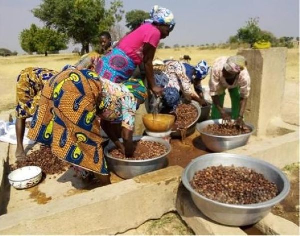
Climate change poses a threat to the survival of shea trees in the nation's northern areas, specifically within the Upper East, Upper West, Northern, North East, and Savannah Regions.
Certainly, shea tree production is experiencing a significant downturn because of the severe climatic conditions impacting their output.
Recent data indicates that sheanut production has dropped between 10% and 20%, with the trend showing no signs of improvement as it keeps plummeting because of climate change along with various other ecological influences.
Although the nation produces more than 150,000 metric tons of shea nuts each year, only around 30-40 percent of this amount is transformed into shea butter within the country itself. The remainder is shipped abroad primarily to Europe in its unprocessed form for further refinement.
Because of the COVID-19 pandemic, shea nut exports decreased marginally in 2020. Just 75,000 metric tons valued at US$70 million were exported from Ghana during this period.
In 2021, however, sheanut exports saw another increase and have continued to grow since then. That year, more than 85,000 metric tons of sheanuts with a value of around US$80 million were exported. By 2022, this figure had risen to over 90,000 metric tons of both sheanuts and shea butter, which amounted to roughly US$90 million.
This is why the Ghana Shea Employers Association (GSEA) has once again urged for a swift prohibition on exporting unprocessed shea nuts, pointing out the increasing risk posed to local processors, participants in the supply chain, and the overall economy in the northern areas.
They express concern that the circumstances are having an adverse impact on harvesters, processors, and local enterprises, with a significant number being female-owned.
The association is therefore calling for participation by foreign investors, on condition that they establish processing factories in Ghana to promote job creation and boost domestic revenue.
Sheanuts, being one of the country’s leading non-traditional agricultural exports, present an opportunity to improve the incomes of rural women in northern Ghana, thereby helping to reduce the north-south development gap.
Rain patterns have become erratic and short-lived, thereby causing intermittent drought. This is taking a toll on peasant farmers who rely heavily on seasonal rainfall for their farming activities.
The effect of climate change is not limited to only food crops. Deep-rooted trees also succumb to the ever-rising temperatures.
Moreover, unchecked activities such as habitat destruction due to uncontrolled extraction, widespread clearance of forests, frequent wildfires, cutting down of shea trees for fuel wood and charcoal production, along with the conversion of shea orchards into agricultural land for industrial farming, pose significant risks to wildlife diversity and contribute substantially to global warming.
Provided by Syndigate Media Inc. ( Syndigate.info ).